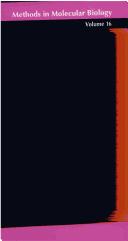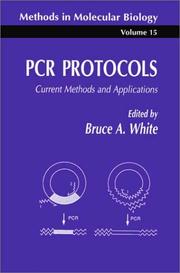| Listing 1 - 10 of 11 | << page >> |
Sort by
|

ISBN: 1281443158 9786611443153 0080586821 0123645476 9780080586823 9780123645470 9781281443151 6611443150 Year: 1993 Publisher: San Diego : Academic Press,
Abstract | Keywords | Export | Availability | Bookmark
 Loading...
Loading...Choose an application
- Reference Manager
- EndNote
- RefWorks (Direct export to RefWorks)
International Review of Cytology presents current advances and comprehensive reviews in cell biology-both plant and animal. Articles address structure and control of gene expression, nucleocytoplasmic interactions, control of cell development and differentiation, and cell transformation and growth. Authored by some of the foremost scientists in the field, each volume provides up-to-date information and directions for future research.
Cells. --- Cytology. --- Cell biology --- Cellular biology --- Biology --- Cells --- Organisms --- Cytology

ISBN: 9780080586830 008058683X 0123645484 9780123645487 9786611443160 1281443166 Year: 1993 Publisher: San Diego : Academic Press,
Abstract | Keywords | Export | Availability | Bookmark
 Loading...
Loading...Choose an application
- Reference Manager
- EndNote
- RefWorks (Direct export to RefWorks)
International Review of Cytology presents current advances and comprehensive reviews in cell biology-both plant and animal. Articles address structure and control of gene expression, nucleocytoplasmic interactions, control of cell development and differentiation, and cell transformation and growth. Authored by some of the foremost scientists in the field, each volume provides up-to-date information and directions for future research.
Cells. --- Cytology. --- Cell biology --- Cellular biology --- Biology --- Cells --- Organisms --- Cytology

ISBN: 9781435673052 1435673050 0123645492 9780123645494 9780080586847 0080586848 1281443174 9781281443175 9786611443177 6611443177 9780080586841 Year: 1993 Publisher: San Diego : Academic Press,
Abstract | Keywords | Export | Availability | Bookmark
 Loading...
Loading...Choose an application
- Reference Manager
- EndNote
- RefWorks (Direct export to RefWorks)
INTERNATIONAL REVIEW OF CYTOLOGY V146
Cells. --- Cytology. --- Cell biology --- Cellular biology --- Biology --- Cells --- Organisms --- Cytology

ISBN: 1592595030 0896033228 Year: 1993 Publisher: Totowa, NJ : Humana Press,
Abstract | Keywords | Export | Availability | Bookmark
 Loading...
Loading...Choose an application
- Reference Manager
- EndNote
- RefWorks (Direct export to RefWorks)
The scientist' s understanding of the cell at the molecular level has advanced rapidly over the last twenty years. This improved understa- ing has led to the development of many new laboratory methods that increasingly allow old problems to be tackled in new ways. Thus the modern scientist cannot specialize in just one field of knowledge, but must be aware of many disciplines. To aid the process of investigation, the Methods Molecular Biology series has brought together many protocols and has highlighted the useful variations and the pitfalls of the different methods. However, protocols frequently cannot be simply taken from the shelf. Thus the starting sample for a chosen protocol may be unavailable in the correct state or form, or the products of the procedure require a different sort of processing. Therefore the scientist needs more detailed information on the nature and requirements of the enzymes being used. This information, though usually available in the literature, is often widely dispersed and frequently occurs in older volumes of journals; not everyone has comprehensive library facilities available. Also many scientists searching out such information are not trained enzymologists and may be unaware of some of the parameters that are important in a specific enzyme reaction.
Life sciences. --- Cell biology. --- Life Sciences. --- Cell Biology. --- Biosciences --- Sciences, Life --- Science --- Cell biology --- Cellular biology --- Biology --- Cells --- Cytologists

ISBN: 0896032361 1592595065 9780896032361 Year: 1993 Volume: 19 Publisher: Totowa, NJ : Humana Press : Imprint: Humana,
Abstract | Keywords | Export | Availability | Bookmark
 Loading...
Loading...Choose an application
- Reference Manager
- EndNote
- RefWorks (Direct export to RefWorks)
Molecular biology --- Membranes (Biology) --- Research --- Methodology --- Membrane Lipids --- Membrane Proteins --- Cell Membrane --- Lipids --- Proteins --- Cellular Structures --- Amino Acids, Peptides, and Proteins --- Cells --- Chemicals and Drugs --- Anatomy --- Cytology --- Biology --- Health & Biological Sciences --- Life sciences. --- Cell biology. --- Life Sciences. --- Cell Biology. --- Cell biology --- Cellular biology --- Cytologists --- Biosciences --- Sciences, Life --- Science --- Cytology. --- Membranes (Biology) - Research - Methodology

ISBN: 0534124089 9780534124083 Year: 1993 Publisher: Belmont Wadsworth
Abstract | Keywords | Export | Availability | Bookmark
 Loading...
Loading...Choose an application
- Reference Manager
- EndNote
- RefWorks (Direct export to RefWorks)
General biochemistry --- Molecular biology --- Cytology. --- Molecular biology. --- Cytologie --- Biologie moléculaire --- Cytology --- Molecular Biology --- 576.3 --- General cytology. The cell as a biological system. General plan, chemical composition, physicochemical and molecular properties --- 576.3 General cytology. The cell as a biological system. General plan, chemical composition, physicochemical and molecular properties --- Biologie moléculaire --- Molecular biochemistry --- Molecular biophysics --- Biochemistry --- Biophysics --- Biomolecules --- Systems biology --- Cell biology --- Cellular biology --- Biology --- Cells --- Cytologists

ISBN: 0896032442 1592595022 9780896032446 Year: 1993 Volume: 15 Publisher: Totowa Humana press
Abstract | Keywords | Export | Availability | Bookmark
 Loading...
Loading...Choose an application
- Reference Manager
- EndNote
- RefWorks (Direct export to RefWorks)
PCR has been successfully utilized in every facet of basic, cli- cal, and applied studies of the life sciences, and the impact that PCR has had on life science research is already staggering. C- comitant with the essentially universal use of PCR has been the creative and explosive development of a wide range of PCR-based techniques and applications. These increasingly numerous pro- cols have each had the general effect of facilitating and acceler- ing research. Because PCR technology is relatively easy and inexpensive, PCR applications are well within the reach of every research lab. In this sense, PCR has become the "equalizer" between "small" and "big" labs, since its use makes certain projects, especially those related to molecular cloning, now far more feasible for the small lab with a modest budget. This new volume on PCR Protocols does not attempt the impossible task of representing all PCR-based protocols. Rather, it presents a range of protocols, both analytical and preparative, that provide a solid base of knowledge on the use of PCR in many c- mon research problems. The first six chapters provide some basic information on how to get started. Chapters 7-19 represent primarily analytical uses of PCR, both for simple DNA and RNA detection, as well as for more complex analyses of nucleic acid (e. g. , DNA footprin ting, RNA splice site localization). The remaining chapters represent "synthetic," or preparative, uses of PCR.
Molecular biology --- Polymerase Chain Reaction --- Polymerase chain reaction --- Réaction en chaîne de la polymérase --- methods --- Methodology --- Méthodologie --- Electronic books. -- local. --- Polymerase chain reaction -- Methodology. --- Polymerization -- Methodology. --- Nucleic Acid Amplification Techniques --- Genetic Techniques --- Investigative Techniques --- Analytical, Diagnostic and Therapeutic Techniques and Equipment --- Animal Biochemistry --- Human Anatomy & Physiology --- Health & Biological Sciences --- -57.088 --- 577.2 --- Chain reaction, Polymerase --- PCR (Biochemistry) --- Polymerization --- DNA polymerases --- methods. --- Special methods and techniques for studing biological molecules. Separation. Centrifuging. X-ray study. Radioisotope methods --- Molecular bases of life. Molecular biology --- Methodology. --- 577.2 Molecular bases of life. Molecular biology --- 57.088 Special methods and techniques for studing biological molecules. Separation. Centrifuging. X-ray study. Radioisotope methods --- Réaction en chaîne de la polymérase --- Méthodologie --- 57.088 --- Polymerisation --- Polymers --- Polymers and polymerization --- Synthesis of polymers --- Chemical reactions --- Synthesis --- Cytology. --- Cell Biology. --- Cell biology --- Cellular biology --- Biology --- Cells --- Cytologists --- Polymerase chain reaction - Methodology --- Polymerase Chain Reaction - methods
Book
ISBN: 0896032450 1592595057 Year: 1993 Volume: 18 Publisher: Clifton, NJ : Humana Press,
Abstract | Keywords | Export | Availability | Bookmark
 Loading...
Loading...Choose an application
- Reference Manager
- EndNote
- RefWorks (Direct export to RefWorks)
Over the past twenty years, the disciplines of cellular and molecular biology have generated a bounty of information pertaining to the understanding of the structure and function of eukaryotic cells . It is now recognized that individual cells regulate their activities in response to a multitude of external signals ; that external signals, a- ing through a limited number of second messenger systems, modulate the cell's pattern of gene expression; and that the cohort of genes available for regulation is dependent upon the developmental history of the cell. Extrapolating these truths to the whole organism is a challenge that has been met by an increasing number of investigators . The wealth of information that molecular and cell biology has provided us with is now being integrated into an understanding of whole t- sues, organs, and organisms. Without such an integration, the molecular information will be nothing more than a confusing catalog of sequences and structures. Central to this project will be the app- cation of the powerful new techniques described in Transgenesis Techniques: Principles and Protocols .
Animals, Transgenic --- Genetic Engineering --- Transformation, Genetic --- Animal genetic engineering --- Genetic transformation --- Transgenic animals --- Animaux transgéniques --- methods --- veterinary --- Technique --- -Genetic transformation --- -Transgenic animals --- Animals --- Transgenic organisms --- Gene transfer --- Transformation (Genetics) --- Genetic recombination --- Microbial genetics --- Nucleic acids --- Transfection --- Animal biotechnology --- Genetic engineering --- Transgenic animals. --- Technique. --- -575.08:577.21 --- 636.082.4 --- 59.084 --- Genetic engineering, genetic manipulation, recombinant DNA --- Breeding methods and techniques. Reproduction --- Laboratory animals --- 59.084 Laboratory animals --- 636.082.4 Breeding methods and techniques. Reproduction --- 575.08:577.21 Genetic engineering, genetic manipulation, recombinant DNA --- Animals, Genetically Modified. --- Animaux transgéniques --- Transformation, Genetic. --- Life sciences. --- Cell biology. --- Life Sciences. --- Cell Biology. --- Cell biology --- Cellular biology --- Biology --- Cells --- Cytologists --- Biosciences --- Sciences, Life --- Science --- 575.08:577.21 --- methods. --- veterinary. --- Cytology.

ISBN: 0896032485 1592595103 1489939962 Year: 1993 Volume: 23 Publisher: Totowa, NJ : Humana Press : Imprint: Humana,
Abstract | Keywords | Export | Availability | Bookmark
 Loading...
Loading...Choose an application
- Reference Manager
- EndNote
- RefWorks (Direct export to RefWorks)
The purpose of DNA Sequencing Protocols is to provide detailed practical procedures for the widest range of DNA sequencing meth ods, and we believe that all the vanguard techniques now being applied in this fast-evolving field are comprehensively covered. Sequencing technology has advanced at a phenomenal rate since the original methods were first described in the late 1970s and there is now a huge variety of strategies and methods that can be employed to determine the sequence of any DNA of interest. More recently, a large number of new and innovative sequencing techniques have been developed, including the use of such novel polymerases as Tag poly merase and Sequenase, the harnessing of PCR technology for linear amplification (cycle) sequencing, and the advent of automated DNA sequencers. DNA sequencing is surely one of the most important techniques in the molecular biology laboratory. Sequence analysis is providing an increasingly useful approach to the characterization of biological systems, and major multinational projects are already underway to map and sequence the entire genome of organisms, such as Escherichia coli, Saccharomyces cerevisiae, Caenorhabditis elegans, and Homo sapiens. Most scientists recognize the importance of DNA sequence data and perceive DNA sequencing as a valuable and indispensable aspect of their work. Recent technological advances, especially in the area of automated sequencing, have removed much of the drudg ery that was formerly associated with the technique, whereas innova tive computer software has greatly simplified the analysis and manipulation of sequence data.
Sequence Analysis, DNA --- Nucleotide sequence --- Séquence nucléotidique --- Nucleotide sequence. --- Sequence Analysis --- Genetic Techniques --- Investigative Techniques --- Analytical, Diagnostic and Therapeutic Techniques and Equipment --- Animal Biochemistry --- Human Anatomy & Physiology --- Health & Biological Sciences --- Sequence Analysis, DNA. --- 57.088.5 --- 577.212.3 --- Methods and techniques for studying structures and properties of biological molecules --- Nucleic acid base and sequence compositon. Experimental deciphering of genetic code. --- 577.212.3 Nucleic acid base and sequence compositon. Experimental deciphering of genetic code. --- Sequence analysis, dna. --- Séquence nucléotidique --- Analysis, Nucleic acid sequence --- Analysis, Nucleotide sequence --- Base sequence (Nucleic acids) --- DNA sequence --- Nucleic acid sequence analysis --- Nucleotide sequence analysis --- RNA sequence --- Sequence, Nucleotide --- Nucleic acids --- Nucleotides --- Sequence alignment (Bioinformatics) --- Nucleic acid base and sequence compositon. Experimental deciphering of genetic code --- Analysis --- Life sciences. --- Cell biology. --- Life Sciences. --- Cell Biology. --- Cell biology --- Cellular biology --- Biology --- Cells --- Cytologists --- Biosciences --- Sciences, Life --- Science --- Cytology.
Periodical
ISSN: 10712690 1543706X Year: 1993 Publisher: Columbia (Md.) : Tissue culture association,
Abstract | Keywords | Export | Availability | Bookmark
 Loading...
Loading...Choose an application
- Reference Manager
- EndNote
- RefWorks (Direct export to RefWorks)
Histology. Cytology --- General embryology. Developmental biology --- in vitro --- cytologie --- dierlijke cellenkweek --- Cell Physiology --- Cytology --- Developmental Biology --- Tissue Culture --- Cell culture --- Tissue culture --- Developmental biology --- Cellules --- Tissus (Histologie) --- Biologie du développement --- Periodicals. --- Culture --- Périodiques --- Cell Physiology. --- Cell Biology. --- Developmental Biology. --- Tissue Culture Techniques. --- Cell culture. --- Developmental biology. --- Tissue culture. --- JEX6 --- Cell Physiological Phenomena. --- Culture Techniques. --- Biology, Developmental --- Embryonic and Fetal Development --- Growth and Development --- Culture Technique --- Technique, Culture --- Techniques, Culture --- Diffusion Chambers, Culture --- Cell Physiological Phenomenon --- Physiology, Cell --- Phenomena, Cell Physiological --- Phenomenon, Cell Physiological --- Cells --- Cellular Biology --- Biologies, Cell --- Biologies, Cellular --- Biology, Cell --- Biology, Cellular --- Cell Biologies --- Cellular Biologies --- physiology --- Periodicals --- Biotechnology --- Chemistry --- Cytology, Cell Biology --- Toxicology --- Life Sciences --- Biology --- Cell Physiological Process --- Cell Physiological Processes --- Physiological Process, Cell --- Physiological Processes, Cell --- Process, Cell Physiological --- Processes, Cell Physiological --- Chemistry. --- Cytology, Cell Biology. --- Cytology. --- Life Sciences. --- Tiere --- Entwicklung --- Biologie --- Allgemeine Biologie --- Ursprung --- Entwicklungsstadium --- Fauna --- Tier --- Tierwelt --- Animals --- Culture Technique, Tissue --- Culture Techniques, Tissue --- Tissue Culture Technique --- Tissues --- Development (Biology) --- Cultures and culture media --- Biowissenschaften --- Fortschritt --- Entstehung --- Evolution --- Eukaryoten --- Cultures (Biology) --- Organ culture --- Growth --- Ontogeny --- Technique --- Cell Biology --- Tissue Culture Techniques --- Animal --- Bildband --- 2017 --- Auxology --- Cell Physiological Phenomena --- Culture Techniques --- Celbiologie. --- Ontwikkelingsbiologie.
| Listing 1 - 10 of 11 | << page >> |
Sort by
|

 Search
Search Feedback
Feedback About
About Help
Help News
News